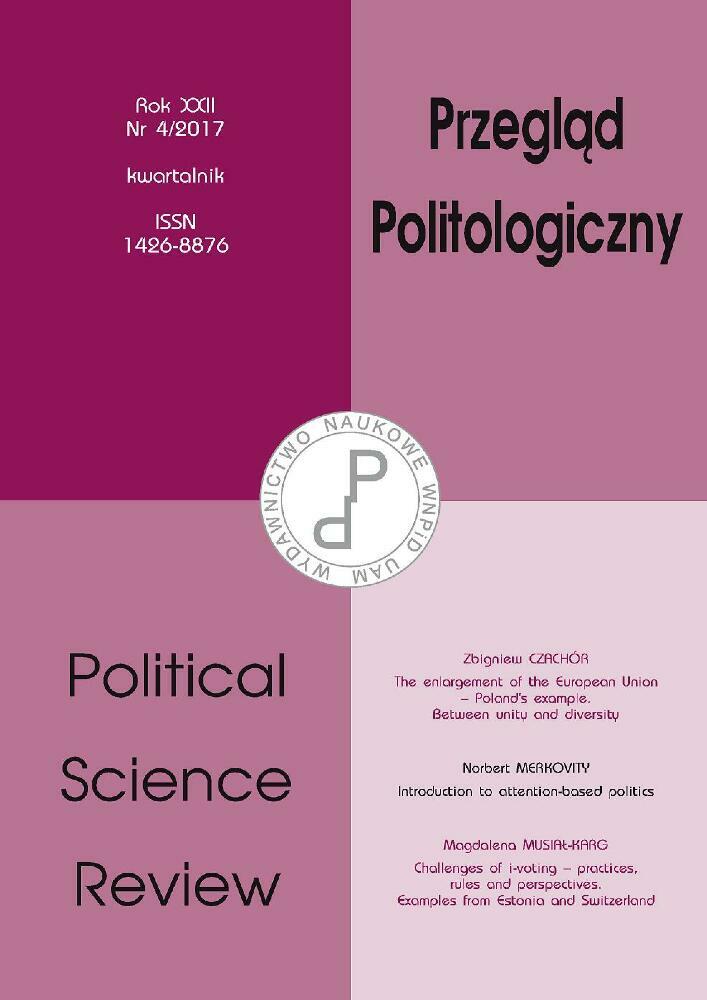Abstract
Russia has always been active militarily; however, the current regime attempts to combine hard power with soft power tools. Russian-Georgian relations are wrought with tensions and clashes. The Western-oriented foreign policy of the latter causes worries in the Kremlin. Although the Russian federation has a strong standing in the Caucasus region, prominently due to its military presence there, the smart power policy is enacted to gain long lasting legitimacy. The mediums, such as pro-Russian non-governmental organizations, cultural intelligentsia and the Church clergy, promote the notion of a common culture and shared values. This promotion is usually accompanied by negative narratives directed towards the liberal West.
References
Armitage R. L., Nye J. S. (2007), How America Can Become a Smarter Power, in: CSIS Commission on Smart Power; A Smart, More Secure America, eds. R. L. Armitage, J. Joseph S. Nye, Center for Strategic and International Studies, Washington, D.C.
BBC (2013), Thousands protest in Georgia over gay rights rally – BBC News, retrieved September 1, 2017, from http://www.bbc.com/news/world-europe-22571216.
BECA (1997), Minimum Requirements for NATO Membership, retrieved September 1, 2017, from https://1997-2001.state.gov/www/regions/eur/fs_members.html.
Bennetts M. (2012), In Putin’s Russia, little separation between church and state, “Washington Times”, retrieved September 2, 2017, from http://www.washingtontimes.com/news/2012/aug/13/putinrussia-little-separation-church-state/.
Civil. (2013), Civil.Ge | Georgia and Shah Deniz II Gas Project, Retrieved August 24, 2017, from http://www.civil.ge/eng/article.php?id=26793,
CRRC (2017a), Do you agree or disagree that there is a Russian propaganda in Georgia?, NDI: Public attitudes in Georgia, April 2017, Caucasusbarometer.org, Online Data Analysis, retrieved August 30, 2017, from http://caucasusbarometer.org/en/na2017ge/RUPROPAG/.
CRRC (2017b), How much influence does Russia have in determining Georgia’s future?, NDI: Public attitudes in Georgia, April 2017, Caucasusbarometer.org, Online Data Analysis, retrieved August 30, 2017, from http://caucasusbarometer.org/en/na2017ge/INFRUSGEF/.
CRRC (2017c), What kind of impact did relations with Russia since 2012 have on nat. security, NDI: Public attitudes in Georgia, April 2017, Caucasusbarometer.org, Online Data Analysis, retrieved August 30, 2017, from http://caucasusbarometer.org/en/na2017ge/RUIMPSEC/.
Dahl R. A. (1957), The Concept of Power, “Behavioral Science”, 2(3), 201–215.
DFWatch (2013), Georgian Patriarch met Putin, http://dfwatch.net/georgian-patriarch-met-putin-29796-16983.
DFWatch (2014), Supporters and opponents of NATO clash in Tbilisi, Democracy & Freedom Watch | News | Democracy & Freedom Watch, retrieved September 3, 2017, from http://dfwatch.net/supporters-and-opponents-of-nato-clash-in-tbilisi-42442-27449.
Dugin A. (2004), Evraziiskaya Ideia v kachstvennom prostranstve, “International Eurasian Movement”.
Dzvelishvili N., Kupreishvili T. (2015), Russian Influence on Georgian NGOs and Media, https://idfi.ge/public/upload/russanimpactongeorgianmediadaNGO.pdf.
Eka Janashia (2014), Moscow Distributes Passports in Georgia. Field Report.
EPRC (2013), Remittance for Family and State, retrieved August 18, 2017, from http://www.eprc.ge/index.php?a=main&pid=219&lang=geo&stext=%E1%83%9B%E1%83%98%E1%83%92%E1%83%A0%E1%83%90%E1%83%9C%E1%83%A2%E1%83%94%E1%83%91%E1%83%98.
Georus (2013), About Project-Our Goals; Movement for the Russian & Georgian Dialogue and Cooperation, retrieved September 4, 2017, from http://www.georus.org/?do=static&page=geo-projeqt.
GeoStat (2013), Georgia’s Export by Countries, retrieved August 21, 2017, from http://www.geostat.ge/?action=page&p_id=133&lang=geo.
GeoStat (2017), Foreign Direct Investments, retrieved August 16, 2017, from http://www.geostat.ge/?action=page&p_id=2230&lang=geo.
GeWorld (2014), Resolution of the Scientific-Practical Conference “Maidan: Lessons for the South Caucasus Countries”, retrieved September 4, 2017, from http://geworld.ge/ge/6199/.
Giorgi Menabde (2014), Kremlin’s Followers in Georgia Become Active, “Jamestown. Eurasia Daily Monitor”, vol. 11, issue 62, retrieved from https://jamestown.org/program/kremlins-followersin-georgia-become-active/#.VkZYhHarTIU.
Hermant N. (2015), Inside Russia’s Troll Factory: Controlling debate and stifling dissent in internet forums and social media, retrieved August 10, 2017, from http://www.abc.net.au/news/2015-08-12/inside-russias-troll-factory-internet-forums-social-media/6692318.
IDFI (2015a), Russian Capital in Georgian Business, retrieved August 21, 2017, from https://idfi.ge/en/russian-capital-in-georgian-business-full-report.
IDFI (2015b), The Impact of Russian Money Transfers on Stability of Georgian Economy, retrieved August 16, 2017, from https://idfi.ge/en/the-impact-of-russian-money-transfers-on-stability-ofgeorgian-economy.
IRI (2011), Georgian National Study 2011.
Iverioni (2015) " Why is May 9 a day of victory for Georgia? ", retrieved September 3, 2017, from http://iverioni.com.ge/13062-ratom-aris-9-maisi-gamarjvebis-dghe-saqarthvelosthvis.html.
Kapanadze S. (2014), Georgia’s Vulnerability to Russian Pressure Points, retrieved from http://www.ecfr.eu/page/-/ECFR106_GEORGIA_MEMO_AW.pdf.
Karaganov S. (2009), Russia in Euro-Atlantic Region, “Rossiyskaya Gazeta”, November 24.
Kevorkova N. (2013), Patriarch of Georgia: Our church and people never cut ties with Russia, RT
Op-Edge, retrieved September 2, 2017, from https://www.rt.com/op-edge/patriarch-georgiarussia-ties-438/.
Kommersant (2014), Грузины подрались из-за Крыма – Мир – Коммерсантъ, retrieved September 6, 2017, from https://www.kommersant.ru/doc/2431652.
Kroenig M., McAdam M., Weber S. (2010), Taking Soft Power Seriously, “Comparative Strategy”, 29(5), 412–431, http://doi.org/10.1080/01495933.2010.520986.
Lomtadze G. (2015), , damoukidebloba, retrieved September 5, 2017, from http://damoukidebloba.com/c/news/neitralitetis_iluzia.
Markozashvili L. (2014), Transition toward Democracy – Georgian problems, “Political Science Review”, 3, 185–203.
Markozashvili L., Al-Weshah A. (2014), Student Attitudes Survey, Erasmus Mundus, Sumi, Ukraine.
McClory J. (2010), The New Persuaders: An International Ranking of Soft Power, The Institute for Government, London.
NationalBank (2017), Remittance by Countries, retrieved August 19, 2017, from https://www.nbg.gov.ge/index.php?m=304.
Nye J. S. (1990), Soft Power, “Foreign Policy”, (80), 153–171, http://doi.org/10.2307/1148580.
Nye J. S. (2004), Soft Power: the Means to Success in World Politics (1st editio), Public Affairs, New York.
Nye J. S. (2006), Think Again: Soft Power, “Foreign Affairs”.
Nye J. S. (2009), Get Smart Combining Hard and Soft Power, “Foreign Affairs”.
Nye J. S. (2010), Can Russia Be Great?, “Project Syndicate”.
Nye J. S. (2014), Putin’s Rules of Attraction, “Project Syndicate”.
PirveliRadio (2014), Putin’s Awards to Alexander Chachia, retrieved September 6, 2017, from http://pirveliradio.ge/?newsid=20257.
Portland (2017), Soft Power 30, retrieved September 2, 2017, from https://softpower30.com/.
Reginfo (2014), Georgian Journalists to Introduce to Media Literacy in Moscow, retrieved September 6, 2017, from http://ick.ge/rubrics/politics/19456-i.html.
Russell B. (2004), Power: A New Social Analysis, Routledge, London–New York.
Saqinform. (2013), Unknown Putin – Book Presentation in Tbilisi, retrieved September 4, 2017, from http://saqinform.ge/news/16233/%E2%80%9Eucnobi+putini%E2%80%9C+-+Tbilisshi+axali+wignis+prezentacia+gaimarTa.html.
Shekhovtsov A. (2009), Aleksandr Dugin’s Neo-Eurasianism: The New Right à la Russe, “Religion Compass”, 3(4), 697–716.
Socor V. (2006), Russia Bans Georgian, Moldovan Wines and Other Products, “Eurasia Daily Monitory”, vol. 3, retrieved from https://jamestown.org/program/russia-bans-georgian-moldovanwines-and-other-products/.
SputnikGeorgia (2015), Rally in front of President’s Palace, with Demand of Military Neutrality, retrieved September 4, 2017, from https://sputnik-georgia.com/society/20150924/228603088.html.
Tsurkov M. (2015), Georgia not to replace Azerbaijani gas by Russian gas, retrieved August 23, 2017, from https://en.trend.az/azerbaijan/business/2447847.html.
WorldBank (2013), World Bank Launches Initiative on Migration, Releases New Projections on Remittance Flows, retrieved August 18, 2017, from http://www.worldbank.org/en/news/pressrelease/2013/04/19/world-bank-launches-initiative-on-migrationreleases-new-projections-onremittance-flows.
